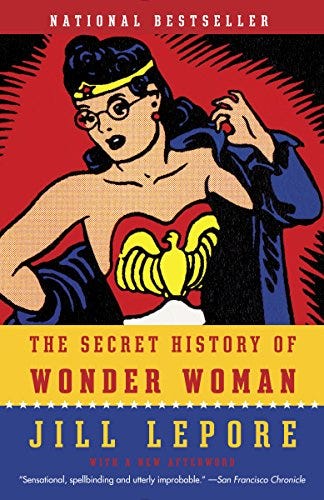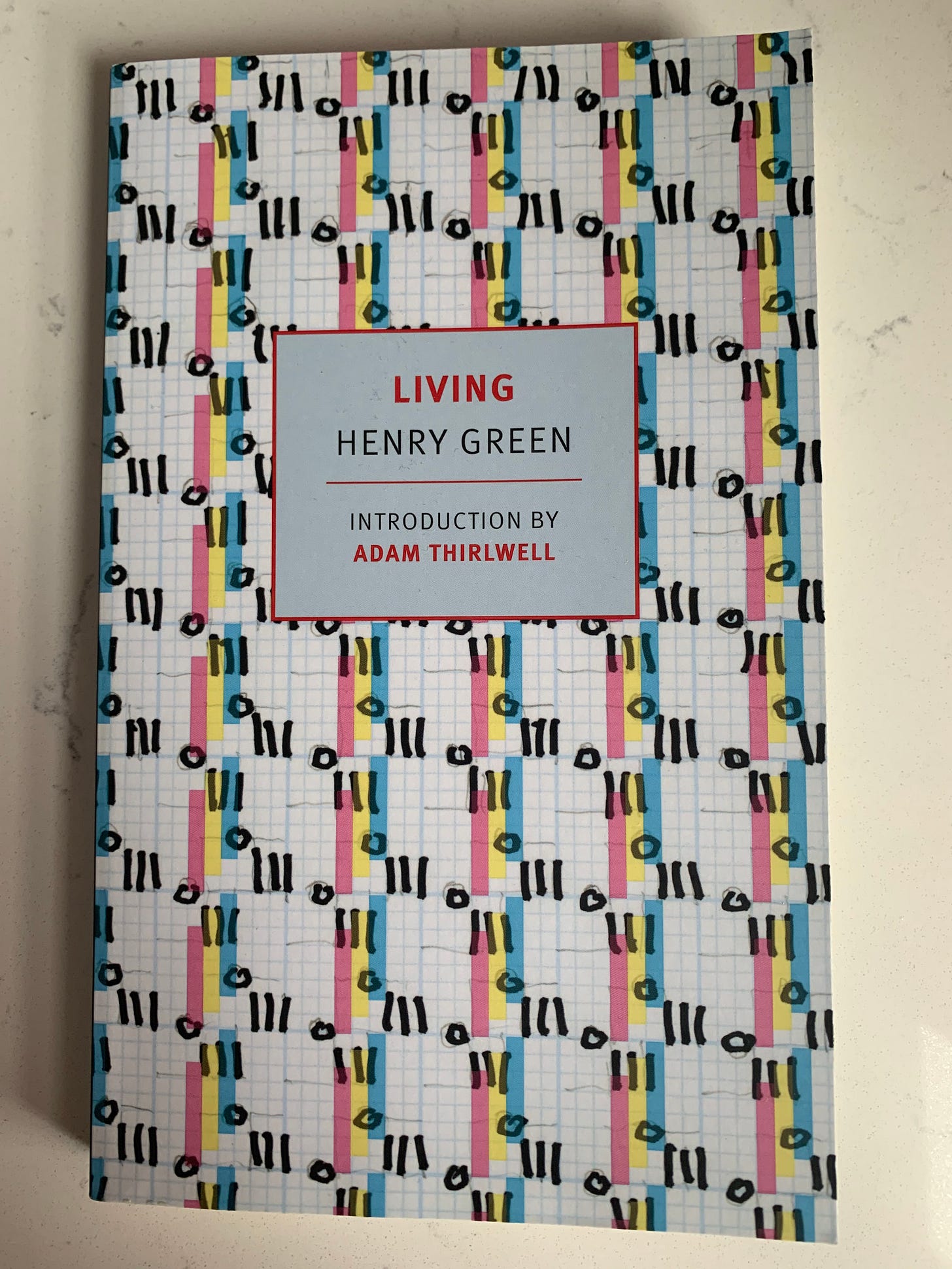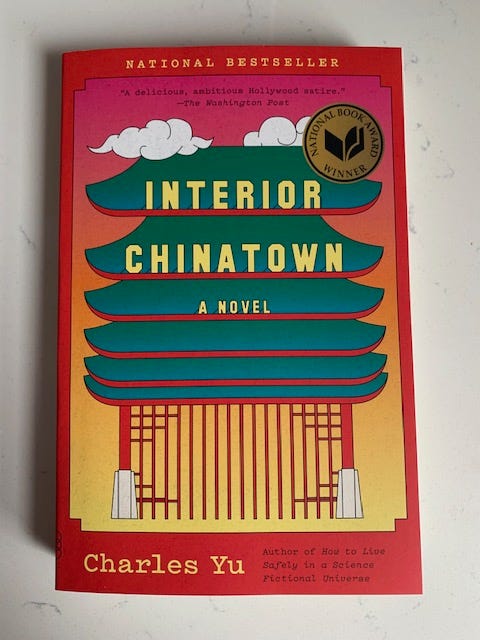3 From BoG: 'The Secret History of Wonder Woman,' 'Living' and 'The Shadow King'
A new Books on GIF feature launches with books from Jill Lepore, Henry Green and Maaza Mengiste—Review #157

Exciting news! Today, Books on GIF launches a new feature called ‘3 From BoG,’ which includes three short reviews. The goal is to allow greater variety and flexibility with genres and authors, and to make room for more books! We have plans for a roundup of short-story collections, as well as one devoted to the works of Italo Calvino. Let us know what you think in the comments, and please suggest themes for future editions. Our aim is to do this approximately once a quarter. Today’s newsletter doesn’t have a particular theme. We figured we’d kick the tires with three books that didn’t have a home in our schedule.
If you enjoy this review, click the ♥️ above or
New here?
‘The Secret History of Wonder Woman’ by Jill Lepore
‘The story of Wonder Woman’s origins wasn’t a neglected history, waiting to be written. It was a family secret locked in a closet.’
Jill Lepore’s deep dive into the origin of the comic-book icon tells the story of Wonder Woman’s inventor, William Moulton Marston, as well as the role the suffrage and birth control movements played in her creation. Margaret Sanger is a prominent figure in the book, but the central focus is on Marston, who also invented the lie-detector test (now we know where the lasso of truth comes from!). We learn all about him (maybe too much), and his polyamorous home life (Wonder Woman’s bullet-blocking bracelets can be sourced to the attire of one of his partners). The book is great scholarship, but it was clear that Lepore was fascinated by Marston, and at times it felt like Wonder Woman was crowded out by the wealth of tidbits about him. I thought the section about early days of publishing the Wonder Woman comic were the most interesting, and I would have preferred more on that. Still, it was a good read and I learned a great deal. So if you imagine Wonder Woman as:

Or:
Or even if you’re not a big comic-book fan, I think you’ll enjoy this book.
How it begins:
Wonder Woman is the most popular female comic-book superhero of all time. Aside from Superman and Batman, no other comic-book character has lasted as long. Like every other superhero, Wonder Woman has a secret identity. Unlike every other superhero, she also has a secret history.
Superman first bounded over tall buildings in 1938. Batman began lurking in the shadows in 1939. Wonder Woman landed her invisible plane in 1941. She was an Amazon from an island of women who had lived apart from men since the time of ancient Greece. She came to the United States to fight for peace, justice, and women’s rights. She had golden bracelets; she could stop bullets. She had a magic lasso; anyone she roped had to tell the truth. To hide her identity, she disguised herself as a secretary named Diana Prince; she worked for U.S. military intelligence. Her gods were female, and so were her curses. “Great Hera!” she cried. “Suffering Sappho!” she swore. She was meant to be the strongest, smartest, bravest woman the world had ever seen. She looked like a pinup girl. In 1942, she was recruited to join the Justice Society of America, joining Superman, Batman, the Flash, and Green Lantern; she was the only woman. She wore a golden tiara, a red bustier, blue underpants, and knee-high, red leather boots. She was a little slinky; she was very kinky.
Over seven decades, across continents and oceans, Wonder Woman has never been out of print. Her fans number in the millions. Generations of girls have carried their sandwiches to school in Wonder Woman lunch boxes. But not even Wonder Woman’s most ardent followers know the true story of her origins. She’s as secret as a heart.
My rating:

‘The Secret History of Wonder Woman’ by Jill Lepore was published in 2015 by Vintage. 464 pages. $16.51 at Bookshop.org
‘Living’ by Henry Green
‘[T]heir lives come to be like puddles on the beach where tide no longer reaches.’
If you’re like me, you enjoy curling up with a good book as a form of escape from workaday stress and office politics. Well, this novel does the opposite of that. ‘Living’ is set nearly a century ago in Birmingham, England. The story tracks the lives of a family whose men work at a foundry, as well as the family who owns it. We see a compelling study of class distinctions and how the whims of the rich can impact workers. But the story so effectively captures the intrigues, gossips, backstabbing and angling that can go on at work that reading it made me feel like I was back at the office. Maybe you miss all that after working from home for a year. But I was like:
In an interesting style choice, as you’ll see below, Green drops many of the articles from his sentences. My understanding is that this choice was to reduce his word count. I’m all for eliding unnecessary words, but losing them here didn’t add to the story. Also, while I empathized with the plight of the workers, and was outraged at the callousness of management, I didn’t connect with any of the characters and struggled to get through the book. Though it’s only 215 pages, it felt like 215,000.
How it begins:
Bridesley, Birmingham.
Two o’clock. Thousands came back from dinner along streets.
“What we want is go, push,” said works manager to son of Mr. Dupret. “What I say to them is—let’s get on with it, let’s get the stuff out.”
Thousands came back to factories they worked in from their dinners.
“I’m always at them but they know me. They know I’m a father and mother to them. If they’re in trouble they’ve but to come to me. And they turn out beautiful work, beautiful work. I’d do anything for ’em and they know it.”
Noise of lathes working began again in this factory. Hundreds went along road outside, men and girls. Some turned in to Dupret factory.
My rating:
‘Living’ by Henry Green was originally published in Great Britain by Hogarth Press in 1929. It was published by the New York Review of Books in 2017. 215 pages. $14 at Bookshop.org.
‘The Shadow King’ by Maaza Mengiste
‘Teferi, all we have is what we remember.’
I was excited to read Maaza Mengiste’s novel when I ordered it during a Harvard Book Store warehouse sale. It was nominated for the 2020 Man Booker Prize, and tells the story of Italy’s invasion of Ethiopia before World War II through the eyes of women who joined the fight. I figured it was right up my alley, telling a story about an often overlooked moment in history from an underrepresented perspective. But I struggled. The story is slow to get going, and once it did, it dragged. It also seems like too many of the character’s interesting experiences occur outside the narrative. For example, one of the main characters Hirut is upset when her father’s rifle is taken away, and she plots to get it back. But we never see why the weapon is her most prized possession. Another character, Aster, dons her husband’s war clothes and rides off on horseback to rally people to the fight. When she returns, we’re told she’s successful, but we don’t see her efforts directly. More telling scenes involving these characters might have made me feel more connected to them. But I wasn’t invested in their plight, and when I got roughly 250 pages in I realized:
I decided it was best to put ‘The Shadow King’ aside for now. I feel bad about it. I really wanted to like this book. This is only the second time in five years that I’ve not finished a book. Perhaps I’ll pick it up again down the road. Let me know in the comments if I should give it another go.
How it begins:
She does not want to remember but she is here and memory is gathering bones. She has come by foot and by bus to Addis Ababa, across terrain she has chosen to forget for nearly forty years. She is two days early but she will wait for him, seated on the ground in this corner of the train station, the metal box on her lap, her back pressed against the wall, rigid as a sentinel. She has put on the dress she does not wear every day. Her hair is neatly braided and sleek and she has been careful to hide the long scar that puckers at the base of her neck and trails over her shoulder like a broken necklace.
In the box are his letters, le lettere, ho sepolto le mie lettere, è il mio segreto, Hirut, anche il tuo segreto. Segreto, secret, meestir. You must keep them for me until I see you again. Now go. Vatene. Hurry before they catch you.
My Rating:

‘The Shadow King’ by Maaza Mengiste was published by W. W. Norton & Company, Inc., in 2019. 424 pages. $16.51 at Bookshop.org.
Disagree with my reviews? Let me know:
Connect: Twitter | Instagram | Goodreads | Email
Before you go:
ICYMI: Review #156 featured ‘The Hare’ by Melanie Finn. | Browse the Archive
Read this: ‘A Lifetime of Reading Taught Min Jin Lee How to Write About Her Immigrant World’ is a beautiful essay in The New York Times about the lifelong benefits of reading.
Do this: Cafe Con Libros in Brooklyn is hosting a virtual author talk with Kenya Hunt, author of ‘Girl, Gurl, Grrrl’ (and my former coworker!), on April 17 at 3 p.m. Click here to RSVP. Glamour magazine says the book is “A provocative, heart-breaking and frequently hilarious collection of original essays on what it means to be Black, a woman, a mother and a global citizen in today’s ever-changing world.”
Thanks for reading, and thanks especially to Donna for editing this newsletter!
Until next time,

MPV
Books on GIF newsletters with most ♥️s













The Wonder Woman book (or I guess the story it tells) is wild.
Eager to get your take on Interior Chinatown.